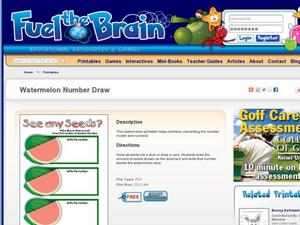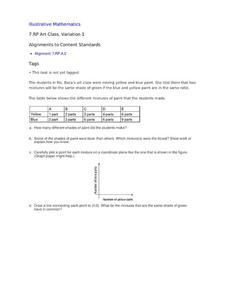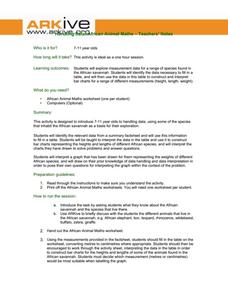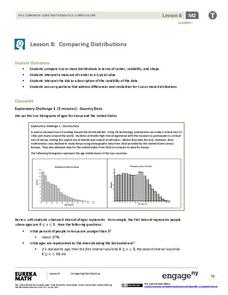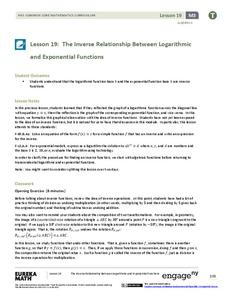Curated OER
See any Seeds?
Oh no! These watermelons have no seeds! Beginning counters use fun templates as they roll dice and draw the resulting number of seeds onto the watermelon image. They also write the number in the space beside the watermelon. Consider...
Curated OER
Measure the Length Word Problems
As you begin explaining measurement with consistent units, scholars can use this to practice before they are introduced to more complicated systems (i.e. a ruler). They measure five familiar objects against a row of boxes, which serve as...
Curated OER
Comparing Fractions with Like Numerators or Denominators
There are five fraction models here and each has a corresponding numeric fraction it represents. Scholars use the models to better comprehend fractions as they match each to its correct numeric form. Although all of these fractions could...
Curated OER
Star Wars: Rays and Angles Edition
Rays and angles and Star Wars? It sounds strange, but it's actually a fun game to help fourth graders get good at measuring and identifying angles and rays with a protractor. Each pair of children chooses which Star Wars character they'd...
Curated OER
Art Class, Variation 1
Student statisticians calculate ratios to determine how many shades of green were mixed by Ms. Baca's art class. They graph the number of blue parts against the number of yellow parts for each combination and discover that some produce...
West Contra Costa Unified School District
Adding by finding 10's
Count with ten frames in a first grade addition lesson. Kids determine how to identify numbers on a number line, as well as with ten frames, and complete ten frames to show their answers in several addition problems.
Common Core Sheets
Determining Coordinates: All Positive Coordinates
Take the numbers out of graphing with an activity about finding positive coordinates. Kids find each symbol or letter at various places on the grid, then note their coordinates in the space provided.
Teach Engineering
Bone Mineral Density Math and Beer's Law
Hop into a resource on Beer's Law. A PowerPoint presentation introduces Beer's law as part of calculating bone density from X-ray images in the sixth lesson in the series of seven. Individuals work on practice problems with this law and...
Penn Museum
Egypt
From pharaohs and pyramids to the mummification process, this packet is a fantastic resource for studying ancient Egypt! Worksheets not only review key terms and practices that are foundational to ancient Egyptian culture, such as...
ARKive
Handling Data: African Animal Maths
Handling and processing data is a big part of what real scientists do. Provide a way for your learners to explore graphs and data related to the animals that live on the African savannah. They begin their analysis by discussing what they...
Edline
Adding and Subtracting Integers
When should you use a number line to add and subtract integers, and when should you use absolute values? Complete a set of worksheets designed to reinforce adding and subtracting integers with both standard problems and word problems....
Virginia Department of Education
Using Order of Operations and Exploring Properties
If you need some creative ways to teach the order of operations, use a series of activities that focus on properties. Each lesson uses different materials and works as a stand-alone activity, or can build upon the concepts of the last...
EngageNY
Comparing Distributions
Data distributions can be compared in terms of center, variability, and shape. Two exploratory challenges present data in two different displays to compare. The displays of histograms and box plots require different comparisons based...
EngageNY
The Inverse Relationship Between Logarithmic and Exponential Functions
Introducing inverse functions! The 20th installment of a 35-part lesson encourages scholars to learn the definition of inverse functions and how to find them. The lesson considers all types of functions, not just exponential and...
Noyce Foundation
Cubism
If cubism were a religion, would you follow it? Lower-level tasks focus primarily on counting the number cubes in a structure and relating the number to surface area. As learners progress to higher-level tasks, isometric drawings and...
West Contra Costa Unified School District
The Power of Ten: Building a Magnitude Model
Add visual representation to teaching place value with a magnitude model. Using adding machine tape, pupils build a linear place value strip from 1 to 100.
Achieve
False Positives
The test may say you have cancer, but sometimes the test is wrong. The provided task asks learners to analyze cancer statistics for a fictitious town. Given the rate of false positives, they interpret the meaning of this value in the...
Northern Arizona University
Adding and Subtracting Fractions
Pattern blocks and shapes demonstrate how to add and subtract fractions. By aligning blocks with different shapes, learners figure out how to create a whole, and then how to add and delete parts from that whole.
Noyce Foundation
Double Down
Double the dog ears, double the fun. Five problems provide increasing challenges with non-linear growth. Topics include dog ears, family trees and population data, and geometric patterns.
Illustrative Mathematics
Distance across the channel
Here you will find a model of a linear relationship between two quantities, the water depth of a channel and the distance across the channel at water level. The cross section of the channel is the shape of an isosceles trapezoid. The...
Curated OER
Rising Gas Prices – Compounding and Inflation
Financial literacy skills and exponential models are connected by the compound interest formula in this task centered on inflation calculations. Collaborative learners get experience collecting data from the given websites and exploring...
Los Angeles County Office of Education
Assessment For The California Mathematics Standards Grade 4
Have scholars show what they know with a 20-page assessment aligned to the California State Standards. The test covers concepts such as large and whole numbers, all four mathematical operations, fractions, decimals, geometric figures,...
Illustrative Mathematics
Party Favors
Pia is putting stickers into party bags. She starts by putting 10 stickers in each bag, and over the course of a week she adds several bundles of ten stickers to each bag, as well as making more bags. Second graders must find the number...
Illustrative Mathematics
What's the Point?
Given a certain amount of points, how many line segments can you connect between them? How many close geometric figures can you create? These are the types of questions learners are asked to solve in a assessment-based instructional...
Other popular searches
- Everyday Math
- Elementary Math
- Esl Lessons Math
- Estimation Math
- Elementary Math Lessons
- Math in Everyday Life
- Math Expressions
- Elementary Math Patterns
- Math Enrichment
- Easter Math
- Esl Math Vocabulary
- Basic Math Equations
